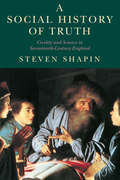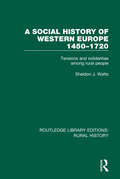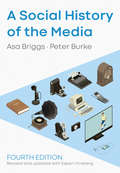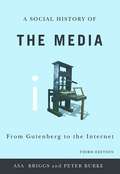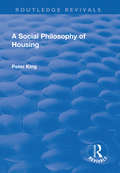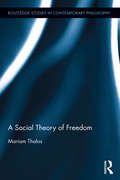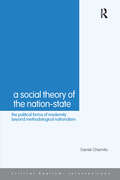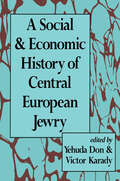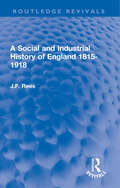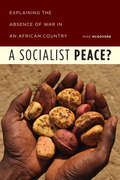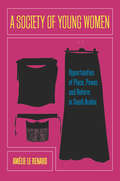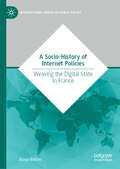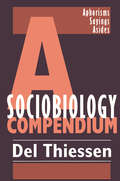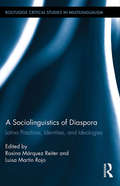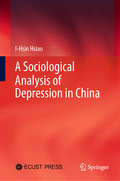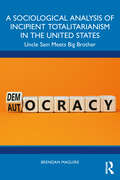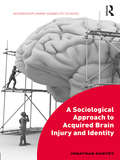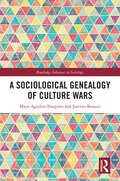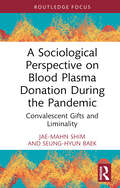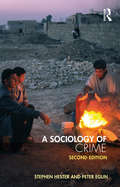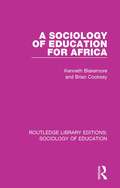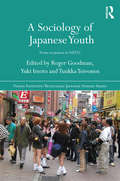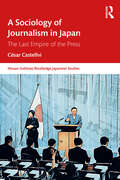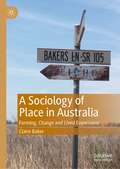- Table View
- List View
A Social History of Truth: Civility and Science in Seventeenth-Century England (Science and Its Conceptual Foundations series)
by Steven ShapinHow do we come to trust our knowledge of the world? What are the means by which we distinguish true from false accounts? Why do we credit one observational statement over another? In A Social History of Truth, Shapin engages these universal questions through an elegant recreation of a crucial period in the history of early modern science: the social world of gentlemen-philosophers in seventeenth-century England. Steven Shapin paints a vivid picture of the relations between gentlemanly culture and scientific practice. He argues that problems of credibility in science were practically solved through the codes and conventions of genteel conduct: trust, civility, honor, and integrity. These codes formed, and arguably still form, an important basis for securing reliable knowledge about the natural world. Shapin uses detailed historical narrative to argue about the establishment of factual knowledge both in science and in everyday practice. Accounts of the mores and manners of gentlemen-philosophers are used to illustrate Shapin's broad claim that trust is imperative for constituting every kind of knowledge. Knowledge-making is always a collective enterprise: people have to know whom to trust in order to know something about the natural world.
A Social History of Western Europe, 1450-1720: Tensions and Solidarities among Rural People (Routledge Library Editions: Rural History #15)
by Sheldon J. WattsThis thoroughly readable and stimulating social history of Western Europe, first published in 1984, explores the family, religion and the supernatural, and the social structure and social controls of rural society. This title will be of interest not only to students, but to anyone who is anxious to understand the lives – both internal and external – of rural people in his fascinating period that is so central to everyone’s past.
A Social History of the Media: From Gutenberg To The Internet (Taurus Historia Ser.)
by Peter Burke Asa Briggs Espen YtrebergThe first three editions of this bestselling book have established A Social History of the Media as a classic, providing a masterful overview of communication media and of the social and cultural contexts within which they emerged and evolved over time.This fourth edition has been revised and updated throughout to reflect the latest developments in the field. Additionally, an expanded introduction explores the wide range of secondary literature and theory that inform the study of media history today, and a new eighth chapter surveys the revolutionary media developments of the twenty-first century, including in particular the rise of social and participatory media and the penetration of these technologies into every sphere of social and private life.Avoiding technological determinism and rejecting assumptions of straightforward evolutionary progress, this book brings out the rich and varied histories of communication media. In an age of fast-paced media developments, a thorough understanding of media history is more important than ever, and this text will continue to be the first choice for students and scholars across the world.
A Social History of the Media: From Gutenberg to the Internet,
by Asa Briggs; Peter BurkeIncreased space is given to the exciting media developments of the early 21st Century, including in particular the rise of social and participatory media and the globalization of media. Additionally, new and important research is incorporated into the classic material exploring the continuing importance of oral and manuscript communication, the rise of print and the relationship between physical transportation and social communication.
A Social Philosophy of Housing (Routledge Revivals Ser.)
by Peter KingThis title was first published in 2003. This text seeks to show the importance of housing to individuals and in the broader context of social welfare. It offers a universal philosophical justification for housing provision based on a detailed theoretical consideration of need, choice, rights and responsibility. The implications of basing housing policies on these concepts are considered. Dr Peter King suggests that we should see housing as, above all, a pre-requisite for human flourishing. As such it is an essentially private activity. As a consequence, he argues, housing policy should be limited to a consideration of the enhancement of the personal fulfilment of individuals rather than seeking to further collective or utilitarian ends. Dr King's purpose in this book is to explore housing using the techniques and methods of social philosophy. He seeks to combat relativist approaches to housing discourse with a theoretical appreciation of housing based on universalist principles derived from Kant and Nozick. The book therefore addresses housing issues with a philosophical rigour, but without ignoring key policy debates.
A Social Theory of Freedom (Routledge Studies in Contemporary Philosophy)
by Mariam ThalosIn A Social Theory of Freedom, Mariam Thalos argues that the theory of human freedom should be a broadly social and political theory, rather than a theory that places itself in opposition to the issue of determinism. Thalos rejects the premise that a theory of freedom is fundamentally a theory of the metaphysics of constraint and, instead, lays out a political conception of freedom that is closely aligned with questions of social identity, self-development in contexts of intimate relationships, and social solidarity. Thalos argues that whether a person is free (in any context) depends upon a certain relationship of fit between that agent’s conception of themselves (both present and future), on the one hand, and the facts of their circumstances, on the other. Since relationships of fit are broadly logical, freedom is a logic—it is the logic of fit between one’s aspirations and one’s circumstances, what Thalos calls the logic of agency. The logic of agency, once fleshed out, becomes a broadly social and political theory that encompasses one’s self-conceptions as well as how these self-conceptions are generated, together with how they fit with the circumstances of one’s life. The theory of freedom proposed in this volume is fundamentally a political one.
A Social Theory of the Nation-State: The Political Forms of Modernity Beyond Methodological Nationalism (Critical Realism: Interventions (Routledge Critical Realism))
by Daniel CherniloA Social Theory of the Nation-State: the political forms of modernity beyond methodological nationalism, construes a novel and original social theory of the nation-state. It rejects nationalistic ways of thinking that take the nation-state for granted as much as globalist orthodoxy that speaks of its current and definitive decline. Its main aim is therefore to provide a renovated account of the nation-state’s historical development and recent global challenges via an analysis of the writings of key social theorists. This reconstruction of the history of the nation-state into three periods: classical (K. Marx, M. Weber, E. Durkheim) modernist (T. Parsons, R. Aron, R. Bendix, B. Moore) contemporary (M. Mann, E. Hobsbawm, U. Beck, M. Castells, N. Luhmann, J. Habermas) For each phase, it introduces social theory’s key views about the nation-state, its past, present and future. In so doing this book rejects methodological nationalism, the claim that the nation-state is the necessary representation of the modern society, because it misrepresents the nation-state’s own problematic trajectory in modernity. And methodological nationalism is also rejected because it is unable to capture the richness of social theory’s intellectual canon. Instead, via a strong conception of society and a subtler notion of the nation-state, A Social Theory of the Nation-State tries to account for the ‘opacity of the nation-state in modernity’.
A Social View of Socotra Island: People, Culture, Heritage
by Nataša Slak Valek Ahmad Abdelmoniem ZedanThis book focuses on Socotra Island, geographically based in Yemen, and aims to explore the island from the social sciences point of view. This book focuses on people indigenous to Socotra, Socotri cultures, heritage and also offers contributions from business, tourism, linguistic, communication, and anthropology. While a lot has been published in natural science about Socotra’s endemic species, biodiversity, and nature in general, social scientific research of the island is very limited. This book addresses therefore addresses this gap and explores various topics of tourism, behaviours, cultures, and language.This book focuses on a clear social science approach of Socotra. The purpose of this book is to publish research about the people, behaviors, heritage, and potential tourism of Socotra. The Socotra Archipelago has long been a land of mystery. It is unknown as a tourism destination for many, however, is a popular destination for adventurers, photographers and travelers who like to travel to remote and undeveloped places. This book explains how Socotra has limited resources of electricity, which is provided by diesel generators, Internet is very slow and limited to certain points on the island. There are no shopping malls or five-star hotels. Roads, schools, and hospitals have been built only recently. This book shoes how these island people do not know the development as we do, which makes it principally interesting to research. Previous interviewers of Socotri people about tourism development in the island have faced many challenges such as language barriers, lack of understanding the meanings and interviewing content, lack of support for the anticipated research results. This book successfully undertakes this challenge as not only in understanding the language, but understanding phenomena like e.g. tourism. Whilst acknowledging the ways in which indigenous island people have never travelled or seen a developed city. Thus, words like ‘developed’, ‘tourism destination’ or ‘washing machine’ may be unfamiliar terms for them. Therefore, new and innovative research methods that are sensitive to Socotra people were implemented in the creation of this book.
A Social and Economic History of Central European Jewry
by Peter J. KitsonThis volume is a pioneering effort to examine the social, demographic, and economic changes that befell the Jewish communities of Central Europe after the dissolution of the Habsburg Empire. It consists of studies researched and written especially for this volume by historians, sociologists, and economists, all specialists in modern Central European Jewish affairs.The era of national rivalry, economic crises, and political confusion between the two World Wars has been preceded by a pre-World War I epoch of Jewish emancipation and assimilation. During that period, Jewish minorities had been harbored from violent anti-Semitism by the Empire, and they became torchbearers of industrialization and modernization. This common destiny encouraged certain common characteristics in the three major components of the Empire, Austria, Hungary, and the Czech territories, despite the very different origins of the well over one million Jews in those three lands.The disintegration of the Habsburg Empire created three small, economically marginal national states, inimical to each other and at liberty to create their own policies toward Jews in accord with the preferences of their respective ruling classes. Active and openly discriminatory anti-Semitic measures resulted in Austria and Hungary. The only liberal heir country of the Empire was Czechoslovakia, although simmering anti-Semitism and below surface discrimination were widespread in Slovakia. While one might have expected Jewish communities to return to their pre-World War I tendencies to go their independent ways after the introduction of these policies, social and economic patterns which had evolved in the Habsburg era persisted until the Anschluss in Austria, German occupation in Czechoslovakia, and World War II in Hungary. Studies in this volume attest to continuing similarities among the three Jewish communities, testifying to the depth of the Empire's long lasting impact on the behavior of Jews in Central Europe.
A Social and Industrial History of England 1815-1918 (Routledge Revivals)
by J.F. ReesFirst Published in 1920, A Social and Industrial History of England 1815-1918 provides within as small a compass as possible, the historical background necessary for the study of modern industrial and social questions. An attempt has been made to show the interaction between political and economic development in the course of nineteenth century by correlating the growth of democratic institutions with the progress of industry. This book is an essential read for scholars and researchers of social history, industrial history, British history, and modern history in general.
A Socialist Peace?: Explaining the Absence of War in an African Country
by Mike McgovernFor the last twenty years, the West African nation of Guinea has exhibited all of the conditions that have led to civil wars in other countries, and Guineans themselves regularly talk about the inevitability of war. Yet the country has narrowly avoided conflict again and again. In A Socialist Peace?, Mike McGovern asks how this is possible, how a nation could beat the odds and evade civil war. Guinea is rich in resources, but its people are some of the poorest in the world. Its political situation is polarized by fiercely competitive ethnic groups. Weapons flow freely through its lands and across its borders. And, finally, it is still recovering from the oppressive regime of Sékou Touré. McGovern argues that while Touré’s reign was hardly peaceful, it was successful—often through highly coercive and violent measures—at establishing a set of durable national dispositions, which have kept the nation at peace. Exploring the ambivalences of contemporary Guineans toward the afterlife of Touré’s reign as well as their abiding sense of socialist solidarity, McGovern sketches the paradoxes that undergird political stability.
A Society of Young Women: Opportunities of Place, Power, and Reform in Saudi Arabia
by Amélie Le RenardThe cities of Saudi Arabia are among the most gender segregated in the world. In recent years the Saudi government has felt increasing international pressure to offer greater roles for women in society. Implicit in these calls for reform, however, is an assumption that the only "real" society is male society. Little consideration has been given to the rapidly evolving activities within women's spaces. This book joins young urban women in their daily lives—in the workplace, on the female university campus, at the mall—to show how these women are transforming Saudi cities from within and creating their own urban, professional, consumerist lifestyles. As young Saudi women are emerging as an increasingly visible social group, they are shaping new social norms. Their shared urban spaces offer women the opportunity to shed certain constraints and imagine themselves in new roles. But to feel included in this peer group, women must adhere to new constraints: to be sophisticated, fashionable, feminine, and modern. The position of "other" women—poor, rural, or non-Saudi women—is increasingly marginalized. While young urban women may embody the image of a "reformed" Saudi nation, the reform project ultimately remains incomplete, drawing new hierarchies and lines of exclusion among women.
A Socio-History of Internet Policies: Weaving the Digital State in France (International Series on Public Policy)
by Anne BellonThis book examines the development of internet policymaking over the last forty years. Drawing on evidence from France and elsewhere, it adopts a sociohistorical perspective to offer insights into the ways democratic states regulate the internet and digital transformation more generally. Adopting a chronological approach and utilising both policy analysis and interviews with key actors, it retells the changing role of the state in internet regulation since the inception of the internet to the present day. It also explores the complex relationships between public administrations and internet organizations, and considers whether states are really capable of governing the digital space. It will appeal to all those interested in public policy, digital studies, sociology and communication studies.
A Sociobiology Compendium: Aphorisms, Sayings, Asides
by Del ThiessenThe novelist Joseph Conrad expressed a great truth when he said: "The mind of man is capable of anything--because everything is in it, all the past as well as the future," Our evolutionary history of noble acts and foul deeds, leading to survival and reproduction, guarantees that we understand the most essential facets of our physical and social environment. The nature of our struggles--our lusts, our fears, our objectivity, our irra-tionality--lies embedded in our cellular DNA and the neurons of our mind, there to play itself out much like it did in the past and much like it will in the future. Many have seen the links between our minds and the universe, the common thread of our existence and the inevitability of our loves and hates. This book includes many demonstrations that our nature has been on the minds and lips of many--poets, play-wrights, philosophers, historians, novelists, kings, slaves, religious leaders, and the great-est of knaves. From Ralph Waldo Emerson to Arthur Schopenhauer, from Aldous Huxley to Arthur Conan Doyle, from Aristotle to William Shakespeare, the truths about our-selves have come tumbling out. Reflecting on their thoughts we see ourselves. The universal nature of our being reflects our common origins and our bittersweet destiny. In A Sociobiology Compendium, Del Thiessen mines the richness of biological inves-tigations of human behavior, comparing current views of human behavior with expres-sions by non-scientists who have, in one way or another, touched the evolutionary strings of men and women. He begins each section with a brief account of biological notions of human behavior. The book shows in astonishing ways how the earlier thoughts of men and women from all cultures anticipate the biological observations about our being. A Sociobiology Compendium will be engaging reading for all psychologists, sociologists, and biologists.
A Sociolinguistics of Diaspora: Latino Practices, Identities, and Ideologies (Routledge Critical Studies in Multilingualism)
by Rosina M Luisa MartThis volume brings together scholars in sociolinguistics and the sociology of new media and mobile technologies who are working on different social and communicative aspects of the Latino diaspora. There is new interest in the ways in which migrants negotiate and renegotiate identities through their continued interactions with their own culture back home, in the host country, in similar diaspora elsewhere, and with the various "new" cultures of the receiving country. This collection focuses on two broad political and social contexts: the established Latino communities in urban settings in North America and newer Latin American communities in Europe and the Middle East. It explores the role of migration/diaspora in transforming linguistic practices, ideologies, and identities.
A Sociological Analysis of Depression in China
by I-Hsin HsiaoThis book explores the relationship between macro-social structure, social construction and micro-healthcare behaviors. It constructs a two-layered and two-faceted sociological analytical framework to analyze the causes of depression in China and account for the comparatively low rate of depression in the country, and provides a sociological interpretation of depression in China from a global perspective that has rarely been adopted in previous sociological studies in China. Presenting first-hand data and case studies, it describes and analyzes patients’ subjective experience and actions as well as physicians’ viewpoints. It also includes interviews with 34 patients, 4 family members, 3 psychological consultants and 5 psychiatrists.Offering an integrated interpretation of depression in China from the perspectives of sociology, medical science and psychology, this book is intended primarily, but not exclusively, for the growing body of researchers and students who are looking for ways of analyzing depression, especially in China. It is also a valuable resource for practitioners working in the field.
A Sociological Analysis of Incipient Totalitarianism in the United States: Uncle Sam Meets Big Brother
by Brendan MaguireUsing George Orwell’s novel Nineteen Eighty-Four as a guide for interpreting the role of the American state in the twenty-first century – paying particular attention to how the government responded to the life and death issues of terrorism, COVID-19, and climate change – this book presents eye-opening and compelling documentary evidence that suggests Orwellian policies have already been implemented by Republicans and Democrats.A Sociological Analysis of Incipient Totalitarianism in the United States advances a groundbreaking sociological explanation for how totalitarian rule is embraced by the public when freedom, equality, and justice are compromised, offering a sociological explanation of how totalitarian rule is operationalized from the macro level to the micro level, using concepts associated with Marx (ruling ideas), Mead (generalized other) and Berger and Luckmann (recipe knowledge) which are especially key to understanding the process. Finally, the book suggests policies that could halt and reverse the progression of totalitarianism in the United States.Scholarly and yet readily accessible to a general readership, this book showcases the sociological importance and enduring influence of Orwell – working as a supplement to Orwell’s Nineteen Eighty-Four and making a meaningful contribution to the public discourse by challenging and informing students and the public about the very real fears of creeping totalitarianism in the United States.
A Sociological Approach to Acquired Brain Injury and Identity (Interdisciplinary Disability Studies)
by Jonathan HarveyInspired by the author’s personal experience of sustaining acquired brain injury (ABI), this path-breaking book explores the (re)construction of identity after ABI. It offers a way of understanding ABI through a social scientific lens, promoting an understanding that is generated through close engagement with the lives and experiences of ABI survivors. The author follows the everyday experiences of six male survivors and critically investigates their identity (re)construction after their ABI. As well as demonstrating identity (re)construction after ABI, the experiences of the participants allow the reader to investigate neurological rehabilitation from their perspective. This book suggests that rehabilitation after ABI is often a continual process that extends beyond the formal, medically prescribed period. It also shows that identity after ABI is often (re)constructed in an unpredictable way; a way that emphasises the importance of reciprocal support and the uncertainty of future life. A Sociological Approach to Acquired Brain Injury and Identity is essential reading for academics and students from a range of social scientific disciplines with an interest in biographical or ethnographic research methods. This book offers a social scientific view of rehabilitation and as such is also essential reading for academics, students and professionals with an interest in health and illness, particularly neurological rehabilitation and brain injury rehabilitation.
A Sociological Genealogy of Culture Wars (Routledge Advances in Sociology)
by Maya Aguiluz-Ibargüen Josetxo BeriainThis book analyzes the culture wars as those struggles for the monopoly of the legitimate representation of the world in the normative elucidation of controversial issues linked to values. Public culture in this context would consist of a set of complex classificatory systems of symbols and meanings that constitute a semantic field in permanent dynamic tension. In this work we analyze a whole series of lines of cultural conflict such as the social and semantic genesis of the different forms of “culture war” from the thesis of “modern polytheism” pointed out by Max Weber at the beginning of the 20th century to the national culture wars and the current global culture wars; the social production of truth and the clash with the epistemological tribalisms; the struggles between the new warrior gods, daimons and demons that emerge in modern societies; the struggles of fusion and fission on the symbolic battlefield of “Europe”; the struggles between “pioneers” and “gatekeepers” to define the limits of human nature; the struggles between utopias and dystopias that colonize the present future. This book will be of great help to anybody looking for key interpretations on the nature and structure of modern conflicts in contemporary societies.
A Sociological Perspective on Blood Plasma Donation During the Pandemic: Convalescent Gifts and Liminality (Routledge Advances in Sociology)
by Jae-Mahn Shim Seung-Hyun BaekShim and Baek examine the evolving existential meanings of gift-making by interviewing donors of convalescent blood plasma during the Covid-19 pandemic.The book reveals what plasma donation means for their efforts to reassemble their lives from being liminal moments to livable experiences, through interviews with convalescent donors in South Korea. It shows it is the very multiplex meanings of plasma donations that enabled people to effectively maneuver through the challenging liminality in life during COVID-19, by expanding the existing literature of gifts and donation that highlights the rich, complex meanings of the body parts donated. It presents a vivid dialogue between liminality and gift-making from varied narratives.A vital read for scholars, students of sociology, anthropology, and public health and those interested in how subjects reconstitute their agency amid uncertainty inside and outside the pandemic, so that we appreciate the voices of donors and learn from the lived experiences of those in this book.
A Sociology of Crime: Second edition
by Stephen Hester Peter EglinHester and Eglin’s A Sociology of Crime has an outstanding reputation for its distinctive and systematic contribution to the criminological literature. Through detailed examples and analysis, it shows how crime is a product of processes of criminalisation constituted through the interactional and organizational use of language. In this welcome second edition, the book reviews and evaluates the current state of criminological theory from this "grammatical" perspective. It maintains and develops its critical and subversive stance but greatly widens its theoretical range, including dedicated chapters on gender, race, class and the post-als including postcolonialism. It now also provides questions, exercises and further readings alongside its detailed analysis of a set of international examples, both classical and contemporary.
A Sociology of Education for Africa (Routledge Library Editions: Sociology of Education #8)
by Kenneth Blakemore Brian CookseyThis book, first published in 1980, provides a summary of the major research findings of previous studies of the sociology of education in Sub-Saharan Africa within an original and stimulating general framework whilst also devoting space to their own research findings. The major themes of the book are education and social inequality, the sociology of the school, the teacher and the curriculum, and education and development. The student of the sociology of development will find a stimulating discussion of education in relation to socio-cultural, economic and political change in contemporary Africa.
A Sociology of Japanese Youth: From Returnees to NEETs (Nissan Institute/Routledge Japanese Studies)
by Roger Goodman Yuki Imoto Tuukka ToivonenOver the past thirty years, whilst Japan has produced a diverse set of youth cultures which have had a major impact on popular culture across the globe, it has also developed a succession of youth problems which have led to major concerns within the country itself. Drawing on detailed empirical fieldwork, the authors of this volume set these issues in a clearly articulated ‘social constructionist’ framework, and put forth a sociology of Japanese youth problems which argues that there is a certain predictability about the way in which these problems are discovered, defined and dealt with. The chapters include case studies covering issues such as: Returnee children (kikokushijo) Compensated dating (enjo kōsai) Corporal punishment (taibatsu) Bullying (ijime) Child abuse (jidō gyakutai) The withdrawn youth (hikikomori) and NEETs (not in education, employment or training) By examining these various social problems collectively, A Sociology of Japanese Youth explains why particular youth problems appeared when they did and what lessons they can provide for the study of youth problems in other societies. This book will be of huge interest to students and scholars of Japanese society and culture, the sociology of Japan, Japanese anthropology and the comparative sociology of youth studies.
A Sociology of Journalism in Japan: The Last Empire of the Press (ISSN)
by César CastellviThis book represents an in-depth analysis of journalism in Japan during the golden era of the daily press and the gradual introduction of digital technology starting from the mid-1980s to the late 2010s.By presenting firsthand testimony from journalists and field notes collected from fieldwork in the newsroom of one of the country's largest newspapers, this book provides a unique insight into Japan’s highly active yet relatively under-institutionalized journalistic profession. It also explores the changes experienced by the organizational development of Japanese journalism in response to broader changes in Japanese society, such as the emergence of social networks, the evolution of reading practices, the demographic situation, and the new aspirations of the Japanese youth.Based on an extensive ethnographic fieldwork carried out by the author over several years, this book will be of huge interest to students and scholars of Japanese society, journalism, and media studies.
A Sociology of Place in Australia: Farming, Change and Lived Experience
by Claire BakerThis book weaves a social, economic and cultural history of Australia with rare first-hand accounts of the lived experience of change related to farming and agriculture. It provides a rich sociology of how living on the land has changed throughout Australia’s history. The book investigates the complex effects of the state on everyday life, using an historical agricultural case study of place to explore long-running sociohistorical processes of change examined through both a macro and micro sociological lens. This provides a multi-faceted perspective from which to examine economic, social and cultural transformations in each of these contexts and change is examined through multiple sites of expression: public policy and the role of the state; colonial processes of dispossession; social and cultural systems of value; economic change and its consequences; farming practices and lived experience; neoliberalism and globalisation and their social impacts; community decline and trends toward corporate and foreign land ownership. Each of these transformations impact upon lived experience and everyday life and this book provides grounded insight into exactly this relationship and process.
